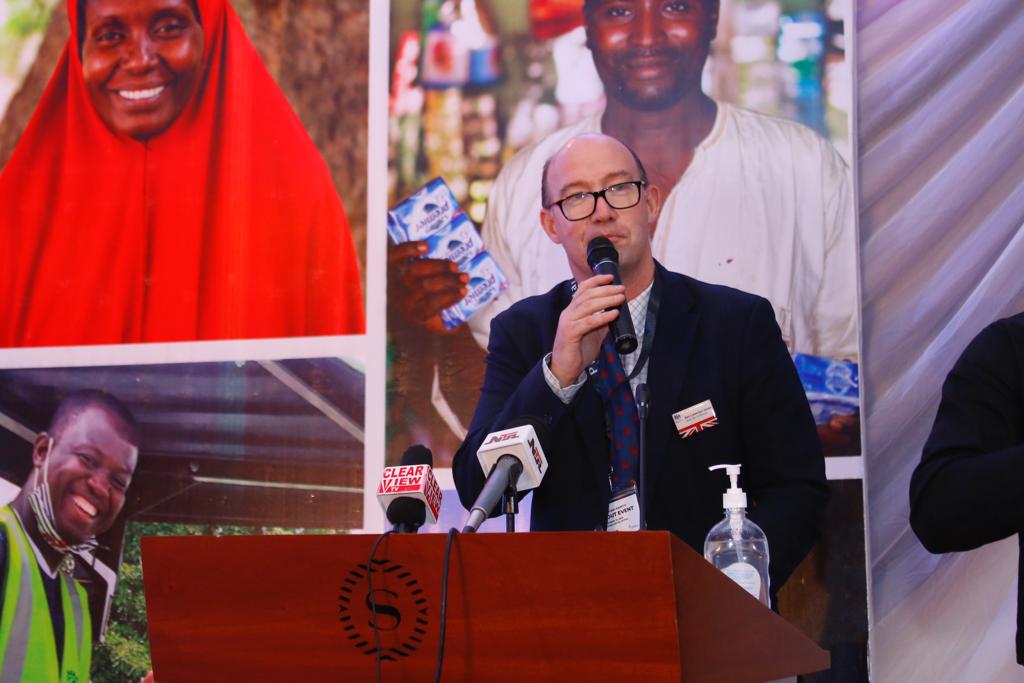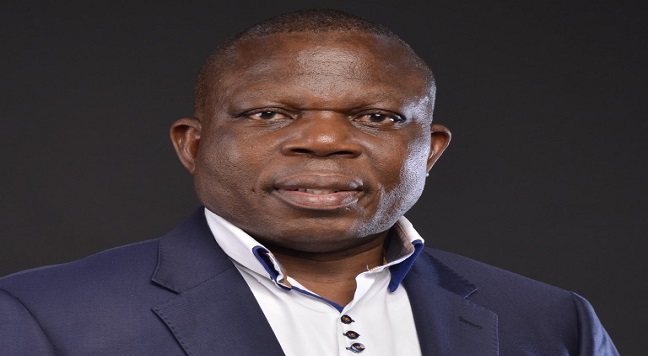News
How Propcom Mai-karfi Helped Smallholder Farmers in Nigeria’s Rural Communities

UK aid funded programme, Propcom Mai-karfi, hosted a closing event at the Sheraton Abuja Hotel on Thursday, 21 October, along with key stakeholders in the agriculture sector.

Ben Llewellyn-Jones, UK’s Deputy High Commissioner in Lagos.
Programme staff explained how the UK Government’s investment in agriculture has expanded market access and catalysed private sector investments to create economic opportunities for smallholder farmers in Northern Nigeria.
In attendance was the Deputy High Commissioner in Lagos, representatives of the UK Government and other donor agencies, commissioners of agriculture in implementing states, development sector partners, private sector stakeholders and civil society organisations.
The event provided a platform for Propcom Mai-karfi to tell its story of impact and to advance discussions on sustaining successes recorded over the years. Strategies for promoting inclusive business models for the private sector, prospects for transformation of the public sector, and opportunities for donors and development partners to improve the effectiveness and efficiency of development support into the region were shared.
UK’s Deputy High Commissioner in Lagos, Ben Llewellyn-Jones, said:“We are very pleased to be able to celebrate today with all our partners the impact Propcom Mai-Karfi has made in Northern Nigeria over the last 9 years.
“Its success has only been possible due to the drive, motivation, and willingness of our partners to adopt the market-driven approaches that ultimately create greater economic opportunities for poor men and women.
“The UK remains committed to supporting inclusive and climate resilient growth in Nigeria, and we look forward to continuing these partnerships.”
Hajiya Halima Lawal, Commissioner of Agriculture, Kaduna State, said:“I want to applaud the UK Government and to offer my congratulations to the entire Propcom Mai-karfi team for the considerable achievements in developing agriculture over the years, especially in promoting pro-poor opportunities and inclusive market growth in Northern Nigeria, and thereby improving the livelihood of citizens in our State and the region.
“As a State, we remain committed to facilitating and attracting investments and look forward with keen anticipation to future collaborations with the UK government.”
Kevin Gager, National Team Leader, Propcom Mai-karfi said:“Defining and/or sustaining various paths to economic recovery and growth demands that existing knowledge and experiences be accounted for in the process. Propcom’s closing event offered up our wealth of experience for everyone to share in the future development efforts in Northern Nigeria.”
Propcom Mai-karfi deployed the ‘Making Markets Work for the Poor – M4P’ approach which focuses on tackling the constraints that affect the markets that poor people participate in so that they can derive higher benefits and values from better functioning market systems.
The Programme targeted market systems with opportunities for poor farmers. It identified factors causing them to perform poorly and facilitated relevant players in the markets to address those underlying constraints. In so doing, Propcom helped to build the capacity of smallholders in climate smart agriculture and helped to provide the knowledge for them to improve their productivity and overall production.
By helping smallholders generate increased income, the Programme stimulated economic recovery in Northern Nigeria to the tune of N37 billion in public and private sector investment.
Deputy Team Leader, Propcom Mai-karfi, Ogheneovo Ugbebor said:“At the heart of Propcom Mai-karfi was sustainability. The Programme assumed only a facilitatory role, never direct delivery, thereby allowing key actors to drive the process from the outset.
“Importantly, Propcom’s intervention designs and strategies were built on the motivation and incentives of key players to act now and in the future, creating the needed drive for continuity. In its facilitative capacity, Propcom sustainably expanded market access to agricultural inputs and services, trade linkages and fostered business and regulatory reforms leveraging billions of Naira in investments from the public and private sectors.”
News
New Horizons Invests N50m to Empower Almajiris with Skills

New Horizons Nigeria has launched a N50 million initiative aimed at transforming 21 Almajiri children into skilled computer technicians within 90 days, to tackle youth unemployment and harness human potential.

The Almajiri-to-Tech programme, officially launched in Abuja on Monday, provides participants with full training, meals, clothing, tools, and logistics support, all fully funded.
Speaking at the launch, the Chief Executive Officer of New Horizons, Tim Akano, said the programme represents a new journey in the history of Nigeria by restoring the original purpose of the Almajiri system, which he described as “children sent out to seek knowledge.”
“The word Almajiri comes from an Arabic term meaning emigrant and seeker of knowledge. Historically, children were sent to learn morals, responsibility, and skills to add value to society,” Akano said.
He added that the disruption of this system during colonial times forced many children onto the streets, a challenge that persists today.
Akano highlighted the urgency of addressing the Almajiri issue, noting that there are an estimated 15 million Almajiris in the country, with a population growth rate of around three per cent annually.
“If we do not solve this problem as a country, we are sitting on a time bomb,” he warned.
According to him, the programme focuses on hands-on technical skills rather than theory. Trainees will learn to repair mobile phones, laptops, televisions, radios, standing fans, and other electronic devices, as well as build inverter batteries using recycled electronic waste.
“We are not teaching theory. We are teaching practical skills you can use to earn a living,” Akano said, stressing that the programme will not interfere with the participants’ Quranic education.
“We are still going to allow you, within the period of learning. Your learning computer here is not stopping your Quranic education.
“You still have time within our space here. Whenever you want to go and pray, you can pray, then come back to class,” the CEO stressed.
He added that participants will also receive daily meals, water, T-shirts identifying them as technicians-in-training, and access to all necessary tools and equipment throughout the 90-day programme.
Akano said the initiative is part of a larger mission by New Horizons Nigeria, which has spent the past 21 years training about 100,000 Nigerians annually in IT and related skills.
He said the new programme aims to “take human genius off the streets and convert it into human capital, enabling these youths to contribute meaningfully to the economy.”
He added that equipping Almajiris with skills could add 15 million people to Nigeria’s workforce and potentially increase the country’s GDP by as much as $20 billion, stressing that productivity depends on practical skills and opportunity.
“Everything that can be taught can be learned. If someone can memorize the Quran cover to cover, there is nothing that cannot be done. What they lack is information, opportunity, and infrastructure, and we are providing all of that,” Akano said.
Akano also stressed that the initiative is designed to inspire other organizations and government agencies to replicate similar programmes across the country.
“This is not just about 21 children; it is about showing Nigeria what is possible when resources meet intention and planning.
“If we succeed in empowering these Almajiris, we demonstrate that the country can turn social challenges into economic opportunities. It’s a blueprint for Nigeria’s future,” he said, noting that the initiative combines social reform, technical education, and economic empowerment.
Also speaking, one of the trainees, Fatima Umar, appreciated the organisers and promised to maximise the opportunity.
“We’ll make you proud of us. We have nothing to say here but to thank and appreciate you. May Almighty Allah continue to guide and protect you,” Umar said.
News
IMF Upgrades Nigeria’s 2026 Growth Projection to 4.4%

International Monetary Fund has upgraded Nigeria’s 2026 economic growth projection to 4.4 per cent, reflecting improved macroeconomic stability and sustained reforms.

IMF
The January 2026 World Economic Outlook Update forecasts Nigeria’s growth trajectory at 4.1 per cent in 2024, 4.2 per cent in 2025, and 4.4 per cent in 2026—a 0.2 percentage point increase from the October 2025 estimate.
This aligns with sub-Saharan Africa’s projected 4.6 per cent expansion in 2026 and 2027, driven by regional stabilisation efforts.
Globally, the IMF anticipates 3.3 per cent growth amid resilient conditions tempered by trade policy shifts and technology investments. For Nigeria, declining energy prices—expected to fall seven per cent due to weak demand—pose risks, though OPEC+ coordination and China’s stockpiling provide support.
Despite the optimism, downside risks persist from Middle East and Ukraine tensions, protectionism, high debt, and fiscal deficits. The Fund recommends rebuilding fiscal buffers, ensuring central bank independence, and limiting temporary fiscal measures to maintain stability.
Nigeria’s success hinges on consistent reforms and resilience against domestic and global shocks, the IMF concluded.
News
Nigeria’s Crude Output Falls to 1.486mbpd in November – OPEC

Organisation of Petroleum Exporting Countries (OPEC) reports that Nigeria’s crude oil production, excluding condensate, dropped by 0.7 per cent to 1.486 million barrels per day (mbpd) in November 2025 from 1.496 mbpd in October.

OPEC
The figure, drawn from secondary sources in OPEC’s December 2025 Monthly Oil Market Report, fell short of Nigeria’s 1.5 mbpd quota. Direct communication data showed output at 1.436 mbpd, up from October’s 1.401 mbpd, but still below target.
Nigeria produces around 196,028 bpd of condensate, excluded from quota calculations per Nigerian Upstream Petroleum Regulatory Commission figures. Year-on-year, November’s output marked a slight gain over 1.417 mbpd in November 2024.
Expert Cites Insecurity, Governance Gaps
Petroleum economics expert Wumi Iledare described the quota miss as unsurprising, blaming persistent insecurity, an ageing oil basin lacking new finds, and unoffered hydrocarbon blocks. Governance shortcomings and policy uncertainty further erode investor confidence, he noted.
Selective implementation of the Petroleum Industry Act worsens the situation, with Nigeria needing a single authoritative leader for the sector rather than multiple proxies, Mr Iledare stressed. The country has struggled to consistently hit OPEC targets for years.

 E-Financial1 day ago
E-Financial1 day agoHere Are Nigerian Banks That Have Secured Their Licences

 E-Financial1 day ago
E-Financial1 day agoZenith Bank Top Nigerian Bank Pick Ahead of GTCO, AccessCorp

 Telecom1 day ago
Telecom1 day agoMTN CEO Toriola Hails Nigeria’s Telecom Transformation at MIPAD

 News1 day ago
News1 day agoICPC Charges Ozekhome with Forgery, Corruption Over London Property

 E-Financial1 day ago
E-Financial1 day agoNigeria Processed $92.1Bn Crypto Transactions in 12 Months — PwC

 Telecom1 day ago
Telecom1 day agoLebara Launches Agent Registration Portal

 E-Financial1 day ago
E-Financial1 day agoHow Crypto Criminals Stole $700m from People – often Using Age-Old Tricks

 E-Business1 day ago
E-Business1 day agoElon Musk Seeks $134Bn from OpenAI, Microsoft for ‘Wrongful Gains’


























